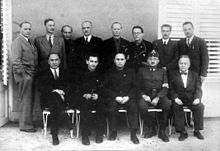Károly Beregfy
Károly Beregfy (Beregffy) (born February 12, 1888 in Cservenka , Austria-Hungary ; died March 12, 1946 in Budapest , executed) was a Hungarian Colonel-General and National Socialist politician . From 1944 to 1945 he was Minister of Defense of the Szálasi regime .
biography
Beregfy, of Danube Swabian descent, entered the Austro-Hungarian army and was promoted to lieutenant in 1912 . After serving as an officer in World War I , he was promoted to captain in 1919 .
In the inter-war period he was later reactivated as an officer during the rule of Reichsverweser Miklós Horthy and was inspector of the border troops from October 1, 1939 to November 1, 1941 with the rank of brigadier general .
During the Second World War , he was Lieutenant General from June 12, 1943 to May 15, 1944, Commander-in-Chief of the 3rd Army and then the 1st Army . In this position he was replaced by General Béla Miklós in early August 1944 .
Beregfy, who was a member of the Arrow Cross , was on October 16, 1944 after this party came to power with the rank of Colonel General Chief of the General Staff and Minister of Defense in the government of Prime Minister Ferenc Szálasi . As defense minister, in his ordinance of October 21, he also forced female Jews between the ages of 16 and 40 to work at the fortifications of the south-east wall . It was also ordered to take equipment, rucksacks and food supplies with you for three days.
On November 4, 1944, after the forced abdication of Miklós Horthy , he became a member of the Regency Council under the chairmanship of Szálasi alongside Sándor Csia and Ferenc Rajniss and held this office until March 28, 1945.
During the Battle of Budapest from December 25, 1944 to February 13, 1945 he was also commander in chief of the Hungarian army . On 7 January 1945, he offered Colonel General Heinz Guderian , the then Chief of General Staff of the Army , taking part of his army associations, the 1st Hussars Division, the 2nd Armored Division and the 23rd Reserve Division, for the military operations of the army , which up to 4 April 1945 ongoing battle for Hungary . However, these associations were too used up for further combat missions.
He held the position of Minister of Defense until March 27, 1945, while he was Chief of the General Staff until the surrender. Fled to the west, he and the government surrendered to the approaching US army in Tann (Lower Bavaria) on May 1, 1945 . He was then arrested by the Americans and finally extradited to Hungary.
Beregfy was sentenced to death for crimes against humanity during World War II together with Gábor Vajna , József Gera and Szálasi by a Hungarian people's court in a trial that took place in the Budapest Music Academy on February 5, 1946 , and on March 12, 1946 in Budapest hanged in public .
Individual evidence
- ↑ Geza Charles Paikert: The Danube Swabians: German population in Hungary, Romania and Yugoslavia, and Hitler's impact on Their patterns. Springer Science & Business Media, 2012. ISBN 9-40119-717-2 , p. 157.
- ↑ Cabinet Szálasi
- ↑ Szabolcs Szita: The death marches of the Budapest Jews in November 1944 to Hegyeshalom-Nickelsdorf. In: Contemporary History. 22. Vol., H. 3/4, ISSN 0256-5250 , 1995, pp. 124-148, (PDF; 226 kB).
- ↑ rulers.org: Hungary .
- ^ Krisztián Ungváry : Battle for Budapest. One hundred days in World War II. IB Tauris, London 2004, ISBN 1-85043-667-3 , p. 235.
- ^ Krisztián Ungváry: The Siege of Budapest. One Hundred Days in World War II. Yale University Press, New Haven CT 2006, ISBN 0-300-11985-2 , p. 190.
- ↑ 13th Armored Division
- ^ Nigel Thomas, László Pál Szábó: The Royal Hungarian Army in World War II. (= Men-at-arms. Vol. 449). Osprey, Oxford 2008, ISBN 978-1-8460-3324-7 , p. 6.
- ^ Liberation of Budapest and war crimes trials .
| personal data | |
|---|---|
| SURNAME | Beregfy, Károly |
| ALTERNATIVE NAMES | Beregffy, Károly |
| BRIEF DESCRIPTION | Hungarian general, politician and war criminal |
| DATE OF BIRTH | February 12, 1888 |
| PLACE OF BIRTH | Cservenka , Hungary |
| DATE OF DEATH | March 12, 1946 |
| Place of death | Budapest |


